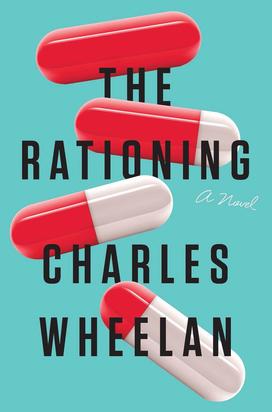Charles Wheelan *93 Explores National Emergencies Through Satire
The book: In a not so-distant future, wonder-drug Dormigen can cure just about any infection. But when a virus breaks out and Dormigen begins to dwindle (due to some shoddy pharmaceutical company practices), the President and governmental top brass must put together a plan to get more Dormigen from allies without inciting national panic over the short supply.
Written as a nonfiction account from an NIH epidemiologist in the Situation Room, The Rationing (W.W. Norton) is a captivating, hilarious, and frighteningly realistic satire about political and personal maneuvering amidst a national crisis.

Opening lines: Warehouse 61 is at the end of a loading dock in the Port of Long Beach. Sometime between midnight and two a.m. on March 21, it caught fire. For reasons that may never be clear (given that it was a very warm night), a homeless man had set a small blaze in an oil drum near the truck entrance to Warehouse 61. The fire somehow spread to a pool of motor oil, setting ablaze the warehouse and several small maintenance buildings. No one was injured except for the homeless man, who was treated for burns at a Los Angeles hospital. The Long Beach Fire Department responded and put out the fire after several hours.
Warehouse 61 is owned and operated by the U.S. government. It is used to store materials coming and going across the Pacific, everything from sophisticated research equipment to school supplies for students in Guam. On March 21, the warehouse also held fourteen chimpanzees, which were being shipped from a government research facility in Hawaii to a private laboratory at Stanford. Thirteen of the fourteen chimps were killed in the fire; the fourteenth, a female named Bobo, was rescued by firefighters. Bobo became the story. Protestors descended on Los Angeles and Long Beach to protest animal experiments by the U.S. government. The President of the United States, the head of the National Institutes of Health, the President of Stanford, and assorted other officials were called upon to explain the necessity of doing research on primates, and, more immediately, why these particular chimps had been left unattended overnight in a warehouse.
Meanwhile, Bobo clung to life. She was attended to by a team of veterinarians, as well as several prominent burn specialists for humans. Money poured in for Bobo’s treatment. By the time she regained consciousness, several days later, still with serious burns and at a high risk of infection, over $25 million had been collected to pay Bobo’s bills. This prompted a wave of counterprotests by those American, myself included, who found it perplexing, if not absurd, that our fellow citizens lavished money on a burned chimp only six months after repealing (once again) the health care coverage for fifty million Americans. The health care debate became even more pitched when it was disclosed that the homeless man burned in the fire, who had third-degree burns over 20 percent of his body, had been quietly turned out of a Los Angeles hospital because he could not pay his bills. This left him at serious risk of infection, and the man would never show up again. Doctors and talking heads tweeted aggressively about who had been more seriously injured, Bobo or the homeless man. For three days, Home Depot Media made Bobo the feature story on all of its receipts and coupons.
The homeless guy was soon forgotten. Bobo got better. She was placed in the Los Angeles Zoo and became a hit attraction. Just last year she “mated successfully” (a term I now use with my married friends), and the world eagerly embraced the son of Bobo, Hanson, who was named for the Long Beach firefighter who rescued Bobo from the warehouse blaze.
Reviews: An entertaining political satire…like a West Wing marathon, with Sorkin-esque dialogue, well-drawn characters, and sharp-edged infighting … A highly readable and intelligent first novel. —Kirkus (starred review)












No responses yet